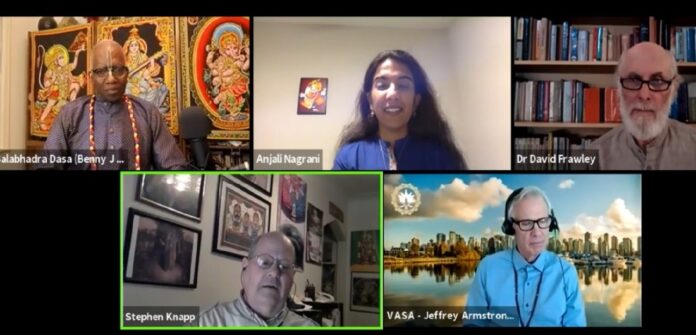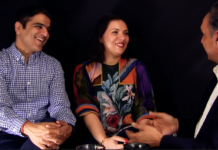The Vedic Friends Association (VFA) hosted their 2.0 Launch Event, “Tools for Human Empowerment – a Yogic Perspective” earlier this month. It was a first of its kind virtual
presentation via Zoom and Facebook Live, highlighting their continued commitment “to
present, preserve, protect and promote the principles and practices of Universal Dharma”.
The event was well attended globally as renowned scholars shared the mission behind VFA
and their vision for the future.
The event was co-hosted by Anjali Nagrani, the Joint Secretary of VFA, and the current
President, Benny Tillman (Balabhadra Bhattacharya Dasa) who gave the opening remarks,
expressing his delight to the panelists for their participation and to the audience for their
anticipation of the upcoming discovery of spiritual tools everyone could avail themselves of
to empower them for facing the future.
VFA’s founding President and current Co-Chairman, Stephen Knapp (Sri Nandanandana
Dasa) was the first speaker. He shared a brief historical overview of VFA and its progress to
the present day, stressing the fact that adopting a Vedic culture could help individuals to
develop their highest potential towards leading a fulfilling life. Initially, VFA’s focus was on
western audiences but he soon discovered on visits to India, that Indian audiences too,
needed guidance in how to preserve their own culture; particularly given the threats from
political and religious elements and the influence of western materialism on younger
generations.
Our second speaker was Jeffrey Armstrong (Kavindra Rishi), Co-Founder and the current
Co-Chairman of VFA. He eloquently mentioned how much Vedic wisdom emerging from
India has relevance and importance in present day world order. He shared a fitting analogy
comparing and contrasting the current bug, COVID-19, to another bug – the “Vedic bug”,
which is rapidly spreading across the world. And unlike its counterpart, this particular bug
is actually helping us! Especially in the current global pandemic environment, in simplistic
ways by encouraging us to adopt ‘Namaste’ instead of shaking hands as a way to greet
fellow human beings. Namaste means I respect you as my fellow time travelers, who like
me, are also on a beautiful, divine journey of learning, a learning to respect others as divine beings.
Jeffrey Armstrong also described a project he has been working for the past 10 years. He
believes that many ideas explained in Vedic culture (in Sanskrit) do not have
corresponding words in English and that becomes a barrier in understanding Vedic
wisdom for the present generation. So he has taken it as a mission to write Bhagawad Gita
verses in English, with Sanskrit words embedded wherever applicable, so the concept
presented by that verse does not get convoluted. Those Sanskrit words will then be
described in the glossary to explain their meanings in the best possible way. He concluded
with the message that if we are able to explain the tenets, principles and tools of the Vedic
wisdom to new generations in their own languages, without losing the real essence of it,
this would be our biggest service (sewa) to humanity. One should promote Vedic culture
with calmness, respect and an open mind. There is a greater need to preach ‘Dharm-ocracy’ – the principle foundation of Vedic Culture, where to honor the thought leaders of every civilization, and honor all religions and have harmonious relationships with everyone on the planet.
Padma Bhushan, Dr. David Frawley (Vamadeva Shastri) was the final speaker. A Vedic
teacher and renowned author, Dr. Frawley spoke of his extensive travels to India, which he
described as the “Land of Vedic culture”. He has witnessed the revival of Vedic culture in
India and worldwide as a positive development. There are Indian communities across the
world making a significant difference in the development of their resident nations. Not only
are more temples being built, but there is also increased awareness of yoga, Ayurveda, and
other Vedic practices globally. He concluded by explaining that one could raise their
consciousness with the aid of Vedic practices, driving the use of technology for the
benefit of mankind, thereby improving the quality of our lives.
Vijai Ganapa, the current Global Coordinator of VFA, thanked the organizations who work
with and support VFA, in its various projects and programs around the world. Notably
mentioned are AOL, ISKCON, Sewa International, VFPA, Hindu Service Foundation and
Hindu Swayamsevak Sangh (HSS). Prakash Srivastava provided technical support for the
live event.
The event was concluded by Balabhadra Dasa thanking the guest speakers and audience for their participation and hinted at more such events being hosted in the near future.
VFA is a Non-Profit Organization with 501C3 and tax exempt status.














